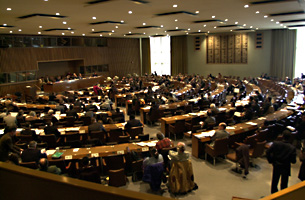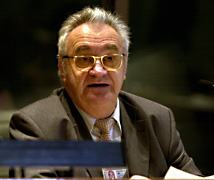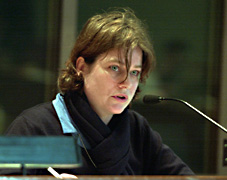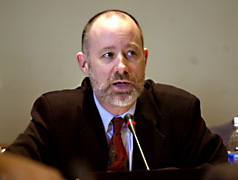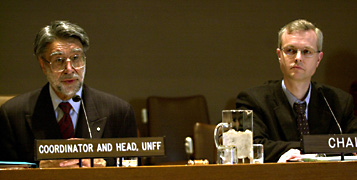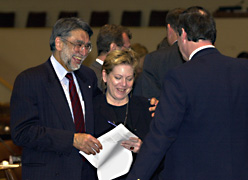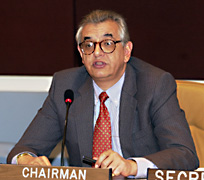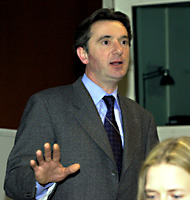 |
UNFF-2:
Second
Session of the United Nations Forum on Forests
UN Headquarters || 4-15 March 2002 |
|
|
|
Day 3: Wednesday 6 March On the third day of UNFF-2, participants moved from the General Assembly Hall to the more familiar ground of Conference Room One (left) and spent the day in a multi-stakeholder dialogue. Five major groups were invited to exchange views with delegates on sustainable forest management (SFM). |
||||||||||||||||||||||||||||||||||
|
|
Christian Mersmann, Director of the Programme on Forests, left, said the motivation to offer guidance for national-level assessment stemmed from wanting to support the UNFF's agenda of implementing the IPF/IFF proposals for action and from recognizing that, due to the complex and diverse nature of the IPF/IFF proposals for action, some guidance on how to approach the proposals and the assessment could be useful to countries. The guidance includes a three step approach to the assessment which begins with the identification of an entry point, for example a national forest programme or other forest-related processes. It also includes a synthesized version of the IPF/IFF proposals for action organized according to the programme elements of the UNFF's Plan of Action. The draft document is available at the PROFOR website at http://www.profor.info/pages/news/. Representatives of Costa Rica and Australia also delivered presentations on their experiences with national-level assessments of the IPF/IFF proposals for action. |
|
Side event: Country-led Initiative on Monitoring Assessment and Reporting (MAR) Mr. Thang Hooi Cheiw of the Ministry of Primary Industry, Malaysia, chaired the side event on monitoring, assessment and reporting (MAR). Mr. Osamu Hashiramoto delivered a presentation on the outcome of the country-led initiative on MAR held in Yokohama, Japan last November. Following the presentation, participants discussed the relationship between criteria and indicators (C&I) for sustainable forest management and the IPF/IFF proposals for action, and the need for capacity building and stakeholder involvement in MAR. |
